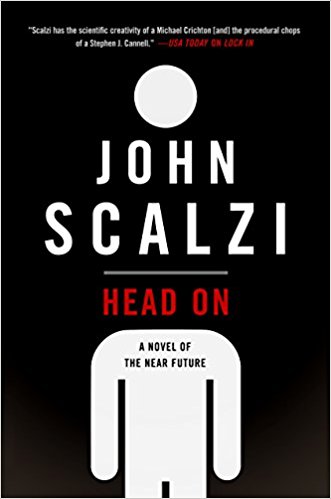 Head On (Lock In, #2)
Head On (Lock In, #2) by
John Scalzi Formats available: hardcover, paperback, large print, ebook, audiobook
Series: Lock In #2 Pages: 336
Published by Tor Books on April 17th 2018
Purchasing Info: Author's Website,
Publisher's Website,
Amazon,
Barnes & Noble,
Kobo,
Bookshop.org Goodreads John Scalzi returns with Head On, the standalone follow-up to the New York Times bestselling and critically acclaimed Lock In. Chilling near-future SF with the thrills of a gritty cop procedural, Head On brings Scalzi's trademark snappy dialogue and technological speculation to the future world of sports.
Hilketa is a frenetic and violent pastime where players attack each other with swords and hammers. The main goal of the game: obtain your opponent’s head and carry it through the goalposts. With flesh and bone bodies, a sport like this would be impossible. But all the players are “threeps,” robot-like bodies controlled by people with Haden’s Syndrome, so anything goes. No one gets hurt, but the brutality is real and the crowds love it.
Until a star athlete drops dead on the playing field.
Is it an accident or murder? FBI Agents and Haden-related crime investigators, Chris Shane and Leslie Vann, are called in to uncover the truth―and in doing so travel to the darker side of the fast-growing sport of Hilketa, where fortunes are made or lost, and where players and owners do whatever it takes to win, on and off the field.
My Review:
 Head On is the sequel to 2014’s utterly marvelous Lock In, and is part of the near-future post-Hadens world that is first introduced in the the novella Unlocked. And that’s a hint that if you are interested in Head On you really need to start with Unlocked, which introduces the worldbuilding and then read Lock In which introduces the main characters of Head On and the scenario in which they find themselves.
Head On is the sequel to 2014’s utterly marvelous Lock In, and is part of the near-future post-Hadens world that is first introduced in the the novella Unlocked. And that’s a hint that if you are interested in Head On you really need to start with Unlocked, which introduces the worldbuilding and then read Lock In which introduces the main characters of Head On and the scenario in which they find themselves.
It’s also more than a hint that while this review of Head On will attempt to be spoiler-free for Head On, there will certainly be spoilers for Lock In.
It has been said that science fiction is a kind of universal recipient when it comes to genres, and that mystery is a universal donor. In the sense that SF is a setting that can contain any genre, while mystery as the “donor” can be injected into any setting.
That’s certainly the case here. Head On is not merely a mystery, but bears a significant resemblance to a specific kind of mystery, the police procedural. Our protagonists in this series, veteran Leslie Vann and her junior partner Chris Sloane are FBI agents investigating a series of deaths that at first appear to be mostly coincidental, but in are all fairly quickly discovered to be murders.
What makes Head On (and its predecessor Lock In) science fiction is the setting. These stories take place in a near-future, near enough that it is recognizable from here. But it is a near-future that is 25 years after the world-wide Hadens pandemic. Hadens Syndrome manifested mostly like a cross between the flu and meningitis. Nasty and serious, but generally not lethal. However, 1% of the world’s population developed a long-term side effect known as “lock in”, where their brains were still very much alive and reacting to stimuli, but had absolutely no way to communicate with the bodies that they were now locked into.
While 1% of the world’s population sounds small, using today’s population numbers (7.6 billion) that would mean that 76 million people were locked in. For a comparison, that’s more than the populations of California and Texas combined. In other words, it’s a LOT of people.
And that’s a lot of people to provide services for, which means there’s a lot of money involved. And a lot of government grants and tax breaks, and a lot of businesses that have grown up around providing for those needs and taking advantage of those government grants. There are lots and lots of lots and LOTS.
So while Head On is a murder mystery, it takes place in a world that could only exist in science fiction, the near-future post-Hadens world.
Chris and Leslie find themselves investigating a crime that could also only exist in this world. A player of the new “Hadens-only” sport, Hilketa, dies during an exhibition match that Chris is attending. It’s the very first player death in Hilketa, but initially it seems not dissimilar to player injuries and player deaths in any contact sport – even though in Hilketa the only contact is between the players’ threeps and not the players’ actual bodies. Still, the adrenaline spikes and emotional tolls of playing a big-money spectator sport are experienced by Hadens players, so it’s not completely surprising that one might suffer a stroke or a seizure while playing.
But the league’s actions after the death move the incident from tragic to highly suspicious in the beat of a heart. And that’s where Chris, and eventually Chris’ partner Leslie, step in. Pulling all the data on the dead player while the match is going on is highly questionable. When the league official who ordered that data pulled commits suicide immediately afterwards, it’s pretty obvious that something is up, even if Chris and Leslie don’t yet know what.
The rules of investigation in the near-future are surprisingly similar to those of the present-day. Or even the historic past. When all else fails – FOLLOW THE MONEY.
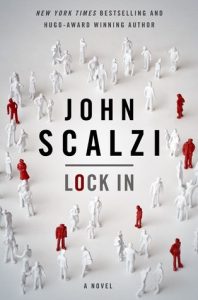 Escape Rating A: I read this on a plane ride from DC to Atlanta. And I read it early relative to its publication date, because I just couldn’t resist the treat any longer. No pun intended, it made the trip absolutely fly by. I’m just sorry that I can’t read it again for the first time – it was just that good.
Escape Rating A: I read this on a plane ride from DC to Atlanta. And I read it early relative to its publication date, because I just couldn’t resist the treat any longer. No pun intended, it made the trip absolutely fly by. I’m just sorry that I can’t read it again for the first time – it was just that good.
Because Chris is a Haden, and his physical presence in the world is represented by a threep (really any threep as Chris borrows and wrecks several) his gender is actually indeterminate. Although he has a physical body, whether that body is male or female doesn’t really matter. What matters is how Chris sees himself and how he presents himself to the world, and not his threep, but his mental presence in the Hadens online universe, the Agora.
And I keep saying “him” and “his” even though Chris never does and it is deliberately kept ambiguous in the story. To the point where there were two audio recordings of Lock In and there will be two of Head On, one read by a female narrator, and one by a male narrator.
I finally figured out that my mental image of Chris is male because he/she/they does not have to think about or deal with any of the baggage that someone physically presenting in the meat-space world as female has to deal with. That Chris does not have all that baggage that women can’t help but pick him made Chris a “him” to me, even if Chris isn’t. (Chris is also mixed race, and as a Haden Chris doesn’t have to deal with any of THAT baggage either.)
The baggage that Chris does have to deal with are the prejudices that people have against threeps. Because they generally see them as robots or droids, and not as presentations for actual human beings. And it does cause problems, but a different set of problems than living/working while either black, female or both.
Part of what makes these books so good is that while this is recognizably a future and not the present, it is also recognizable as human space and human beings and human reactions. Whether meat or threeps, people are still people, for all the good and bad definitions of “people”. Human nature does not change based on the carrier it’s in. As a species we still clearly have a lot of work to do.
The case that Chris and Leslie have to solve could only happen in this SFnal universe. At the same time, it very much follows the pattern of a police procedural mystery, even if some of those procedures have necessarily been altered.
The mystery is relatively easy to solve for the reader. It is considerably more difficult for Chris and Leslie to prove, but the villain is fairly obvious pretty early on. Which does not make the story one scintilla less fascinating to follow.
I had an absolute blast. If you like science fiction, or mysteries, or John Scalzi’s writing, or especially all of the above, you will too.
As the final act in my Blogo-Birthday Celebration Week, I’m doing the same thing I did last year – taking this opportunity to share one of my favorite authors with one lucky commenter. The winner of this giveaway will receive a copy of any book by John Scalzi, up to $20 in value, anywhere that the Book Depository ships. This will allow the winner to choose the hardcover of Head On if that’s what they want – the book comes out on 4/17, so the giveaway closes just in time to get a pre-order in. But the winner can choose ANY title they want, from his first book, the marvelous Old Man’s War, to the hilarious (and Hugo-Award-winning) Redshirts or anything between then and now. If the winner wants an ebook, and can get ebooks from Amazon (or audiobooks from Audible) that’s OK too.
a Rafflecopter giveaway

 The President's Brain Is Missing by John Scalzi
The President's Brain Is Missing by John Scalzi  It did remind me more than a bit of the author’s When the Moon Hits Your Eye in the sense that the crisis is just so completely off the wall and comes out of absolute nowhere. Although this story about the President’s missing brain did a much better job at, at least, nodding towards causality than Moon did and I liked it more for that.
It did remind me more than a bit of the author’s When the Moon Hits Your Eye in the sense that the crisis is just so completely off the wall and comes out of absolute nowhere. Although this story about the President’s missing brain did a much better job at, at least, nodding towards causality than Moon did and I liked it more for that.
 Constituent Service: A Third District Story by
Constituent Service: A Third District Story by  Last but not least, Constituent Service is very much in the vein of the author’s recent books,
Last but not least, Constituent Service is very much in the vein of the author’s recent books,  Starter Villain by
Starter Villain by  Escape Rating A: Charlie starts out Starter Villain in WAY, WAY over his head. Part of his charm is that he never loses sight of that fact. He’s always aware that he hasn’t got a clue, and isn’t likely to get one any time soon, and is secretly panicking about it every other minute. Which is a big chunk of why we like him and end up rooting for him so hard, because his inner voice is asking the same questions that a lot of us would be asking in his place.
Escape Rating A: Charlie starts out Starter Villain in WAY, WAY over his head. Part of his charm is that he never loses sight of that fact. He’s always aware that he hasn’t got a clue, and isn’t likely to get one any time soon, and is secretly panicking about it every other minute. Which is a big chunk of why we like him and end up rooting for him so hard, because his inner voice is asking the same questions that a lot of us would be asking in his place. Travel by Bullet (The Dispatcher #3) by
Travel by Bullet (The Dispatcher #3) by  I’ve always assumed that
I’ve always assumed that  Escape Rating A: The author of The Dispatcher series is best known for two things, his science fiction and his excellent line in snark. Travel by Bullet, and the entire series so far, has a whole lot more of the latter than the former.
Escape Rating A: The author of The Dispatcher series is best known for two things, his science fiction and his excellent line in snark. Travel by Bullet, and the entire series so far, has a whole lot more of the latter than the former. The Kaiju Preservation Society by
The Kaiju Preservation Society by  Escape Rating A-: The Kaiju Preservation Society reads like vintage Scalzi of the
Escape Rating A-: The Kaiju Preservation Society reads like vintage Scalzi of the  Murder by Other Means (The Dispatcher #2) by
Murder by Other Means (The Dispatcher #2) by 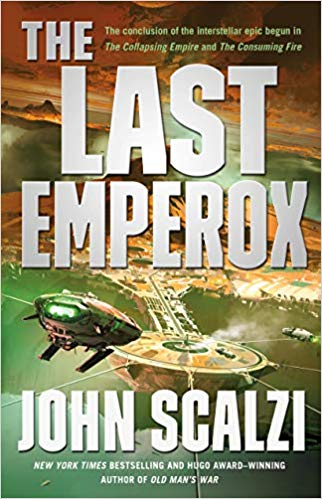 The Last Emperox (The Interdependency, #3) by
The Last Emperox (The Interdependency, #3) by 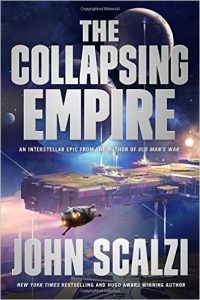 Making it all the more amazing that when this story began, with the writing of the first book in the series,
Making it all the more amazing that when this story began, with the writing of the first book in the series, 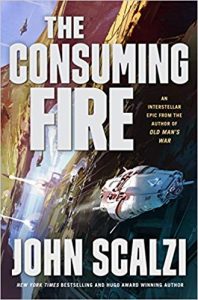 Escape Rating A+: I had a terrible approach/avoidance issue with this book. A part of that was because I had originally intended to listen to it, as I have to the entire rest of the series. The walking profanity explosion that is Kiva Lagos is best appreciated in audio. She just doesn’t have the same impact when reading the book yourself. Also, Wil Wheaton has done a fantastic job with the series, including this entry. But I normally listen while driving, or while on a treadmill at the gym, and everything has been closed. I had more time for reading but fewer opportunities for listening. In the end I mostly played Solitaire and just let the audio wash over me. It was marvelous.
Escape Rating A+: I had a terrible approach/avoidance issue with this book. A part of that was because I had originally intended to listen to it, as I have to the entire rest of the series. The walking profanity explosion that is Kiva Lagos is best appreciated in audio. She just doesn’t have the same impact when reading the book yourself. Also, Wil Wheaton has done a fantastic job with the series, including this entry. But I normally listen while driving, or while on a treadmill at the gym, and everything has been closed. I had more time for reading but fewer opportunities for listening. In the end I mostly played Solitaire and just let the audio wash over me. It was marvelous.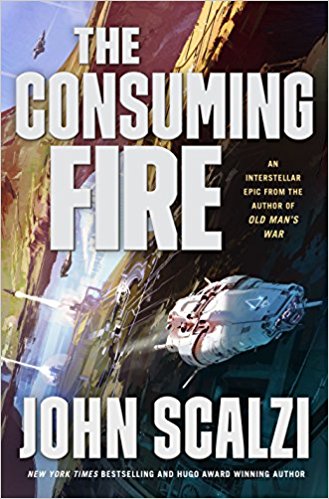 The Consuming Fire (The Interdependency #2) by
The Consuming Fire (The Interdependency #2) by 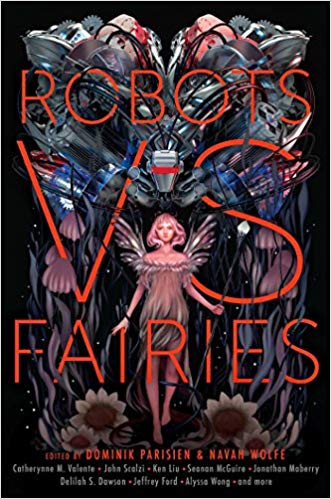 Robots vs. Fairies by
Robots vs. Fairies by  Head On (Lock In, #2) by
Head On (Lock In, #2) by  Head On is the sequel to 2014’s utterly marvelous
Head On is the sequel to 2014’s utterly marvelous  Escape Rating A: I read this on a plane ride from DC to Atlanta. And I read it early relative to its publication date, because I just couldn’t resist the treat any longer. No pun intended, it made the trip absolutely fly by. I’m just sorry that I can’t read it again for the first time – it was just that good.
Escape Rating A: I read this on a plane ride from DC to Atlanta. And I read it early relative to its publication date, because I just couldn’t resist the treat any longer. No pun intended, it made the trip absolutely fly by. I’m just sorry that I can’t read it again for the first time – it was just that good.